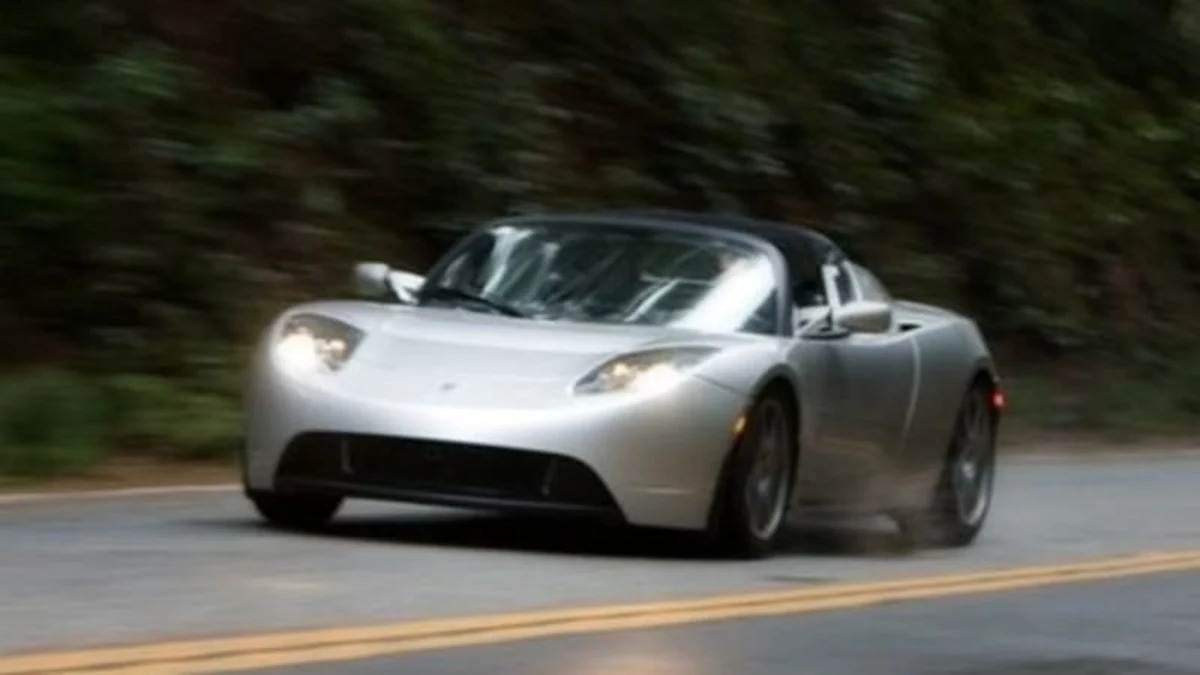Ever since Tesla Motors started letting outsiders actually drive the Roadster late last year the reviews of the over-the-road experience have been largely favorable. In recent months, Tesla has been taking the Roadster on a European tour trying to drum up sales on the continent. One of the people who drove the Roadster was Guido Reinking, editor of Automobilewoche. Reinking praised the performance saying "the car offered the emotional, heart-pounding ride of a street racer." However, he also highlighted powertrain and battery issues we haven't heard about before, aside from the well-documented transmission issues.
Of the three cars available for the test drive, one apparently didn't run at all, while a second reportedly emitted smoke from the battery compartment. Reinking uses these issues to highlight the problem of battery reliability and why the Roadster might not be ready for mass production. However, we checked with Tesla SVP of marketing Darryl Siry who was also on hand for these 16 days of media and prospective customer drives. According to Darryl, two of the three cars on hand were equipped with the new 1.5 drivetrain while the third had the 1.0 interim drivetrain. Siry tells us that the car that wouldn't go had a faulty parking pawl sensor. The parking pawl is essentially a locking mechanism for the transmission that keeps the car from rolling when the gear lever is in park just as it does on a conventional automatic. The sensor erroneously detected park being engaged and prevented the car from moving. Read on after the jump for more on the "smoky" battery.
[Source: Automotive News - sub. req'd]
Reinking was present only on the first of 16 consecutive days of drives. Another driver had taken out one of the drivetrain 1.5 cars. Siry responed to Reinking's description of the incident as follows:
In this case being reported by Reinking, he appears to have something of an initial bias against electric drive given his opening sentence, "I have to admit that I don't find it appealing to consider a future in which we'll all be driving electric cars." Perhaps he should have done a little more checking before writing his column.
Of the three cars available for the test drive, one apparently didn't run at all, while a second reportedly emitted smoke from the battery compartment. Reinking uses these issues to highlight the problem of battery reliability and why the Roadster might not be ready for mass production. However, we checked with Tesla SVP of marketing Darryl Siry who was also on hand for these 16 days of media and prospective customer drives. According to Darryl, two of the three cars on hand were equipped with the new 1.5 drivetrain while the third had the 1.0 interim drivetrain. Siry tells us that the car that wouldn't go had a faulty parking pawl sensor. The parking pawl is essentially a locking mechanism for the transmission that keeps the car from rolling when the gear lever is in park just as it does on a conventional automatic. The sensor erroneously detected park being engaged and prevented the car from moving. Read on after the jump for more on the "smoky" battery.
[Source: Automotive News - sub. req'd]
Reinking was present only on the first of 16 consecutive days of drives. Another driver had taken out one of the drivetrain 1.5 cars. Siry responed to Reinking's description of the incident as follows:
One of the test drivers took one of our prototypes on the Autobahn and drive it at vMax with repetitive hard accelerations. As the car is designed to do, it gave several successive warnings that temperature levels in the motor and electronics were reaching high levels (we know this from the computer logs). Since the driver continued the top speed runs, the computer slowed the car down as it is designed to do to protect itself. After that reporter (I don't think it was you, but someone else who experienced this, but please correct me if I am wrong) reported to us that he thought he had seen smoke coming from the back of the car, we were, of course, concerned. Even though the smoke alarm in the battery pack had not detected smoke, we decided to check it out thoroughly. Tesla technicians removed the battery pack and inspected every aspect, finding nothing wrong with the battery pack. In fact, it performed flawlessly for dozens of other test drives over the next 2 weeks (Munich was day 1 of 16 days of straight media drives). I still don't know what might have caused the journalist to report smoke - perhaps something like a wet leaf came into contact with the very hot motor - but the safety systems and powertrain performed as expected. All things considered, not bad for a full speed run on the Autobahn for a car that was admittedly not designed for sustained top speed.This is the first battery related issue that we're aware with the Roadster. Although in this case there was apparently no issue with the battery pack, the fact that something like this could potentially happen gives some credence to the approach being taken by major automakers like GM, Toyota and Nissan. All of the established manufacturers are developing batteries specifically for automotive use with larger format cells that would use far simpler construction than the Tesla battery pack. Major automakers are also pursuing different types of battery chemistry that sacrifice some energy density in favor of additional safety margins.
In this case being reported by Reinking, he appears to have something of an initial bias against electric drive given his opening sentence, "I have to admit that I don't find it appealing to consider a future in which we'll all be driving electric cars." Perhaps he should have done a little more checking before writing his column.


Sign in to post
Please sign in to leave a comment.
Continue